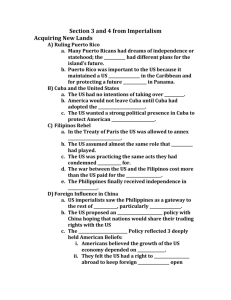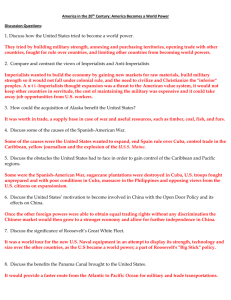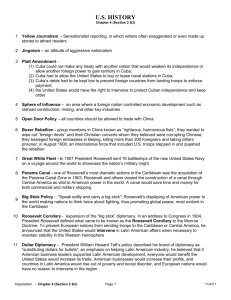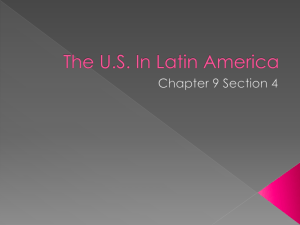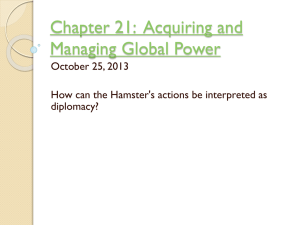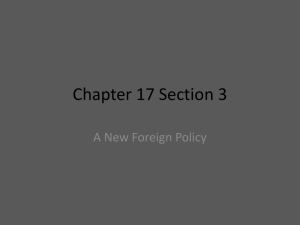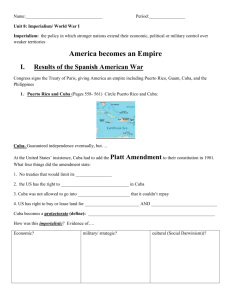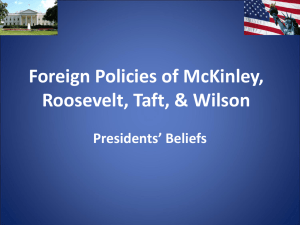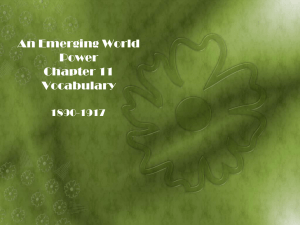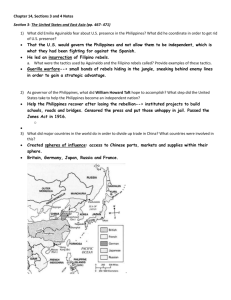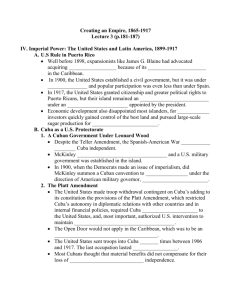USH and LATIN AMERICA-9-10-12
advertisement
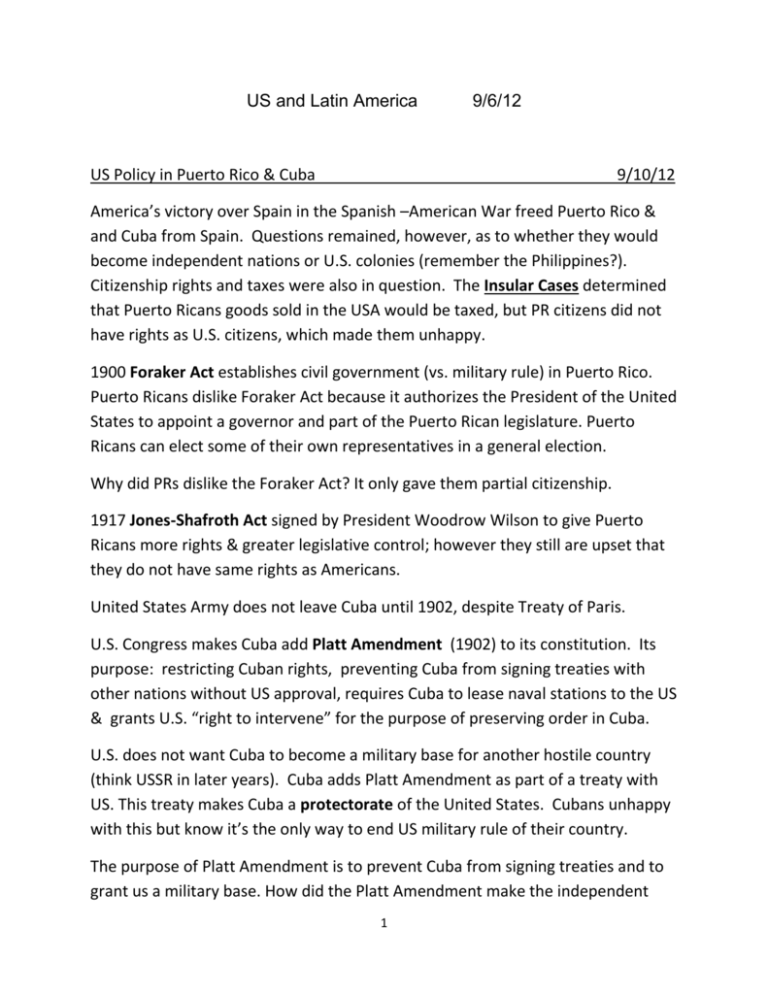
US and Latin America 9/6/12 US Policy in Puerto Rico & Cuba 9/10/12 America’s victory over Spain in the Spanish –American War freed Puerto Rico & and Cuba from Spain. Questions remained, however, as to whether they would become independent nations or U.S. colonies (remember the Philippines?). Citizenship rights and taxes were also in question. The Insular Cases determined that Puerto Ricans goods sold in the USA would be taxed, but PR citizens did not have rights as U.S. citizens, which made them unhappy. 1900 Foraker Act establishes civil government (vs. military rule) in Puerto Rico. Puerto Ricans dislike Foraker Act because it authorizes the President of the United States to appoint a governor and part of the Puerto Rican legislature. Puerto Ricans can elect some of their own representatives in a general election. Why did PRs dislike the Foraker Act? It only gave them partial citizenship. 1917 Jones-Shafroth Act signed by President Woodrow Wilson to give Puerto Ricans more rights & greater legislative control; however they still are upset that they do not have same rights as Americans. United States Army does not leave Cuba until 1902, despite Treaty of Paris. U.S. Congress makes Cuba add Platt Amendment (1902) to its constitution. Its purpose: restricting Cuban rights, preventing Cuba from signing treaties with other nations without US approval, requires Cuba to lease naval stations to the US & grants U.S. “right to intervene” for the purpose of preserving order in Cuba. U.S. does not want Cuba to become a military base for another hostile country (think USSR in later years). Cuba adds Platt Amendment as part of a treaty with US. This treaty makes Cuba a protectorate of the United States. Cubans unhappy with this but know it’s the only way to end US military rule of their country. The purpose of Platt Amendment is to prevent Cuba from signing treaties and to grant us a military base. How did the Platt Amendment make the independent 1 nation of Cuba a protectorate of the U.S? The amendment required Cuba to get permission from the US prior to signing treaties. How did the outcome of the SA War affect the people of Cuba and PR? They had restricted rights. R oosevelt’s Big Stick Diplomacy: “Big stick” stemmed from the Theodore Roosevelt’s African saying, “Speak softly and carry a big stick; you will go far.” (see Idiom of the week). He felt the U.S. had a moral responsibility to civilize or uplift weaker nations due to Social Darwinism. Why did Roosevelt advocate the “big-stick” diplomacy for the U.S.? He believed that the U.S. had a responsibility to “civilize” other nations. Big Stick Diplomacy depended on a strong military to achieve American’s goals. The Panama Canal route (land) was purchased by the US for 40 million from a French company that had abandoned their attempt to build the canal. America paid Panama 10 million dollars for the canal and additional funds in rent. The Panama Canal shortened the trade route. It cut approx. 8000 nautical miles off of the trip from the west coast to the east coast of the U.S. Many workers were killed by malaria (from mosquitos). Therefore, the mosquito population had to be controlled by using several methods including drainage, oiling, mowing, screening and Quinine. The Panama Canal opened in 1914 and was managed by a series of locks. After declaring independence from Columbia, Panama gave the US control over the canal What action did the US take to get the rights on which the PC was built? The US military supported the Panamanian rebels Roosevelt updates the Monroe Doctrine by developing the Roosevelt Corollary. 2 According to the Roosevelt Corollary, the United States justifies its intervention in Latin America It prevented European powers from intervening there. It stated that the US would assume the role of police power in case of “chronic wrongdoing” by a Latin American nation. Latin America reacts to the Roosevelt Corollary: LAs resented the U.S.’s police power. Economic Imperialism =Roosevelt Corollary How did the Roosevelt Corollary update the Monroe Doctrine, which kept European powers out of Latin American? Claimed the U.S. had the right to intervene in Latin America Taft switches to Dollar Diplomacy: Roosevelt wanted Taft to succeed him as President in the 1908 election. They shared basic foreign policy objectives. Taft wanted an Open Door Policy in Asia and stability in Latin America, but his aim was to expand US trade rather than to civilize lesser nations (remember Social Darwinism of the Imperial age?). In wanting less “big stick” and more “dollar diplomacy”, Taft looked to substitute “dollars for bullets”. Military intervention was still necessary at times to maintain order for US financial interests. Taft sent troops to Nicaragua in 1909 & again in 1912—to protect the formation of a pro-American government from local uprisings How did Taft’s dollars diplomacy gain economic power in LA countries? We invested in banks and businesses and resources. Wilson Pursues Moral Diplomacy Woodrow Wilson criticized the foreign policies of his Republican predecessors Theodore Roosevelt and William Howard Taft. Wilson appointed the anti-imperialist William Jennings Bryan as Se. of State. Moral Diplomacy: Woodrow Wilson’s statement that the U.S. would not use force to assert influence in the world, but instead worked to promote human rights. The US Supports Honest Government in Latin America 3 Wilson takes U.S. foreign policy in a different direction. His three major ideas for Moral Diplomacy are human rights, national integrity, and opportunity. In 1915, Wilson sends Marines to Haiti to protect American investments and to guard against the potential of German or French aggression in the nation. Revolution Grips Mexico Mexican dictator Porfirio Diaz grew foreign investments and the wealthy grew richer while the farmers struggled in poverty. American business people chose to invest in Mexico and as a result, they owned large portions of Mexico’s industries. 1911: Franasco Madero led the Mexican Revolution that overthrew Diaz, but Madero was a weak leader. Victorian Huerta took over by executing Madero. Wilson Sends U.S. Troops Into Mexico xx 4
